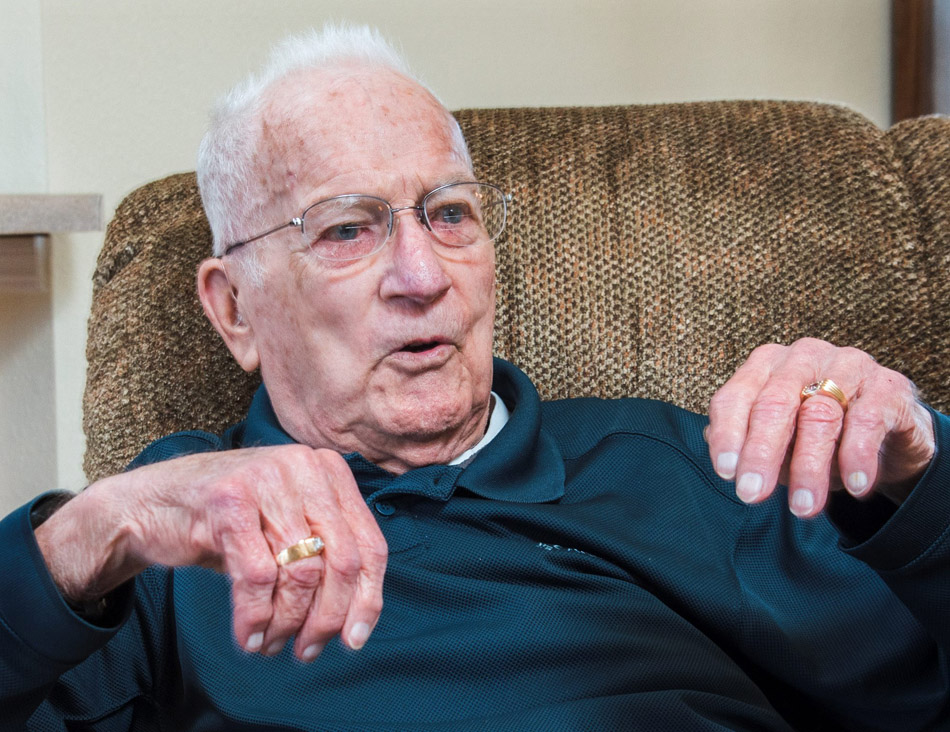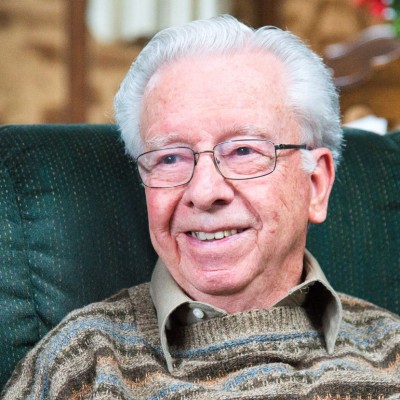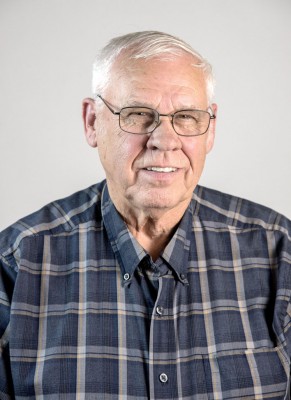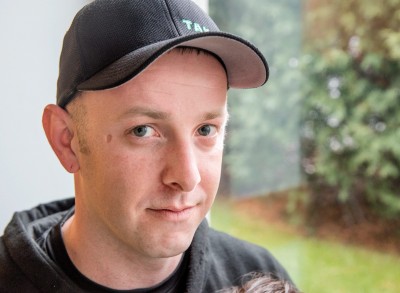Loyd Longenbaugh
By Paul Wood

Photo By Robin Scholz/The News-Gazette
URBANA — Elite fighter pilot Loyd Longenbaugh was “all muscle and hair, no brains” when he piloted his P-38 in Italy and Germany during World War II.
Then a second lieutenant, Longenbaugh, 92, had to fly his twin-engine Lockheed fighter — designed to go more than 350 miles an hour — on just one engine more than once.
In fact, on three of his first five missions, an engine was hit.
He flew over the Alps into Germany, and flying back on one engine was a test of his abilities — weaving through the Alps because he could no longer fly over them.
In the end, he spent more than 30 years in the Air Force, and another 35 at the Champaign-Urbana Mass Transit District, from which he retired only recently.
A preacher’s son who grew up all over central Illinois, he dug ditches for $1.50 a day during the Great Depression. When he first heard that the Japanese had bombed Pearl Harbor, it was in a house that had only recently gotten electricity.
The news was so stunning, he wasn’t sure if it was true at first.
But a year later, on a brutally cold day, he drove a friend to Chanute Field to take a test for the Army Air Forces. It was so cold outside, he came in to Grissom Hall, and a sergeant cajoled him into taking the test.
The friend failed, but it turned out Longenbaugh was made to be a pilot.
He was called to active duty two months after enlisting, and was trained for 13 months on a variety of planes.
Then he was assigned to the P-38 Lightning, nicknamed the “fork-tailed devil.”
It didn’t hurt that, though athletic, he was on the small side, because the P-38’s cockpit was not roomy.
“They had to pull you out after a long mission,” Longenbaugh recalled.
Besides its .50-caliber machine guns and a cannon, the P-38 could be outfitted with bombs, though that limited its maneuverability in dogfights, Longenbaugh said.
“I really enjoyed strafing,” Longenbaugh recalls of his missions.
He felt no compunction about dive-bombing the rails in front of and behind a train, then strafing the train itself.
“It felt great to strafe a row of tanks,” he added.
The P-38s also flew as bomber cover, but Longenbaugh said he rarely saw German planes, with a rare exception being a jet that streaked effortlessly past him.
More often, it was the anti-aircraft fire — German “88s” — that put him into peril.
Once, when he was hobbled with only one engine, he was grateful that a Messerschmitt he saw never took off after him. He returned the favor by not attacking it.
“If he lets me go, I’ll let him go,” he said.
After the war, he stayed in the Air Force. He flew in Korea but was eventually grounded as his depth perception deteriorated when he got too tired.
He then had the distinction of being involved in a third war, Vietnam. In that war, his role was mainly covert, as he managed a CIA motor pool in Thailand. He barely resisted an invitation to join the spy agency, he recalled.
Married in 1948 to Marjorie Dillman — their first date was at Kickapoo Park — he fathered three daughters.
“God gave me a great life,” he said.
Do you know a veteran who could share a story about military service? Contact staff writer Paul Wood at pwood@news-gazette.com.
Read more stories from local veterans:
 Don Muse
Inside the turret of a 5-inch gun, Don Muse was firing at kamikaze planes off Okinawa on the USS Norman Scott. “Things h …
Don Muse
Inside the turret of a 5-inch gun, Don Muse was firing at kamikaze planes off Okinawa on the USS Norman Scott. “Things h …
 John McNeely
ARMSTRONG — Marine John McNeely held off three attacks by the Viet Cong in a short period, and survived a grenade and a …
John McNeely
ARMSTRONG — Marine John McNeely held off three attacks by the Viet Cong in a short period, and survived a grenade and a …
 Dann Hufford
RANTOUL — Staff Sgt. Dann Hufford earned the Bronze Star facing down a truck full of explosives heading right at him. It …
Dann Hufford
RANTOUL — Staff Sgt. Dann Hufford earned the Bronze Star facing down a truck full of explosives heading right at him. It …